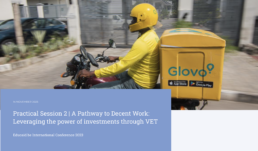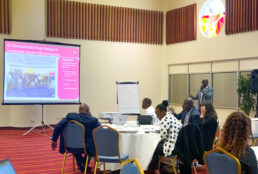Webinar - "A pathway to decent work: Leveraging the power of investments through VET"
Type of event:
Date:

Month: October 2023
Investments show potential for generating job opportunities, but aligning them with decent work standards remains complex.
This webinar organised by VET Toolbox on 14 November from 1 p.m. to 2:30 p.m. as part of Educaid.be’s International Conference 2023 explored how Vocational Education and Training (VET) can contribute to local decent job creation while catering for investments’ needs.
VET Toolbox’s project “Skills4Riders”, operating in the gig economy in Nigeria, shared its challenging journey towards decent work, linking investments and skills development.
Closing Workshop - Kenya project
Type of event:
Date:

Month: October 2023
At the Mövenpick Hotel in Nairobi on October 17, 2023, the VET Toolbox project’s Closing Workshop in Kenya marked a significant step towards sustainable e-waste management in the country. With approximately 30 participants including public and private sector partners (such as Computers For Schools Kenya, E-Waste Initiative Kenya (EWIK), the National Industrial Training Authority (NITA), Mathenge Technical Training), the workshop was a platform for reflection and planning.
About the project:
This VET Toolbox initiative implemented by GIZ aimed to strengthen e-waste management in Kenya, successfully developing National Occupational Standards and a comprehensive curriculum for e-waste processing technicians, ensuring high-quality standardised education. Collaboration with the National E-waste Steering Committee established robust public-private partnerships. Over 400 beneficiaries have been trained, with more than 100 ready for employment.
Workshop insights:
The workshop addressed sector challenges and opportunities, emphasizing the need for robust recycling regulations, community mobilisation, extended producer responsibility, and research into e-waste distribution. The curriculum needs further enhancement beyond the project’s scope through continuous stakeholder involvement and trainer development. Empowering trainees for entrepreneurship is key to sector growth and sustainability. Gender inclusivity is also a priority, with strategies like enrollment quotas, gender policies, and adapted training infrastructure to promote equality.




